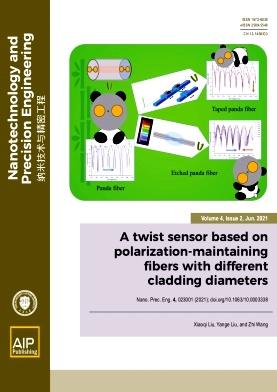Direct fabrication of flexible tensile sensors enabled by polariton energy transfer based on graphene nanosheet films
IF 2.7
3区 工程技术
Q2 MATERIALS SCIENCE, MULTIDISCIPLINARY
Nami Jishu yu Jingmi Gongcheng/Nanotechnology and Precision Engineering
Pub Date : 2023-03-01
DOI:10.1063/10.0016758
引用次数: 2
Abstract
A fundamental problem in the direct manufacturing of flexible devices is the low melting temperature of flexible substrates, which hinders the development of flexible electronics. Proposed here is an electron-cyclotron-resonance sputtering system that can batch-fabricate devices directly on flexible substrates under a low temperature by virtue of the polariton energy transfer between the plasma and the material. Flexible graphene nanosheet-embedded carbon (F-GNEC) films are manufactured directly on polyimide, polyethylene terephthalate, and polydimethylsiloxane, and how the substrate bias (electron energy), microwave power (plasma flux and energy), and magnetic field (electron flux) affect the nanostructure of the F-GNEC films is investigated, indicating that electron energy and flux contribute to the formation of standing graphene nanosheets in the film. The films have good uniformity of distribution in a large size (17 mm × 17 mm), and tensile and angle sensors with a high gauge factor (0.92) and fast response (50 ms) for a machine hand are obtained by virtue of the unique nanostructure of the F-GNEC film. This work sheds light on the quantum manufacturing of carbon sensors and its applications for intelligent machine hands and virtual-reality technology.基于石墨烯纳米片薄膜的极化子能量转移柔性张力传感器的直接制造
直接制造柔性器件的一个根本问题是柔性衬底的熔融温度低,这阻碍了柔性电子的发展。本文提出了一种电子回旋共振溅射系统,该系统可以利用等离子体和材料之间的极化子能量传递,在低温下直接在柔性衬底上批量制造器件。在聚酰亚胺、聚对苯二甲酸乙二醇酯和聚二甲基硅氧烷上直接制备柔性石墨烯纳米片嵌入碳(F-GNEC)薄膜,并研究了衬底偏压(电子能量)、微波功率(等离子体通量和能量)和磁场(电子通量)对F-GNEC薄膜纳米结构的影响,表明电子能量和通量有助于薄膜中直立石墨烯纳米片的形成。该薄膜在大尺寸(17 mm × 17 mm)上具有良好的分布均匀性,并且由于F-GNEC薄膜独特的纳米结构,获得了测量因子高(0.92)、机械手响应快(50 ms)的拉力和角度传感器。这项工作揭示了碳传感器的量子制造及其在智能机械手和虚拟现实技术中的应用。
本文章由计算机程序翻译,如有差异,请以英文原文为准。
求助全文
约1分钟内获得全文
求助全文
来源期刊

Nami Jishu yu Jingmi Gongcheng/Nanotechnology and Precision Engineering
Engineering-Industrial and Manufacturing Engineering
CiteScore
6.50
自引率
0.00%
发文量
1379
审稿时长
14 weeks
 求助内容:
求助内容: 应助结果提醒方式:
应助结果提醒方式:


